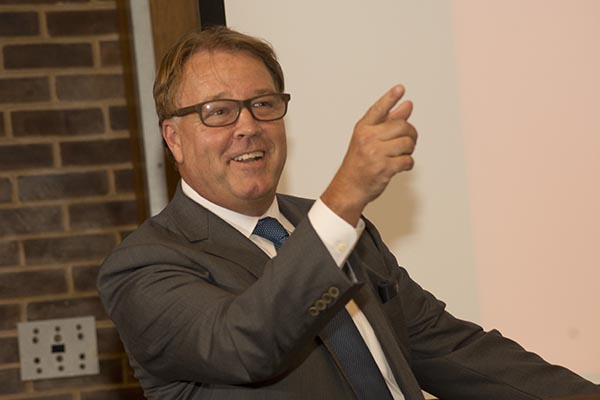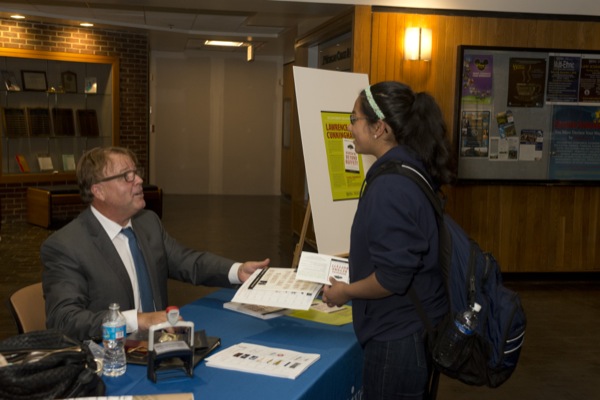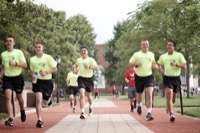


Tyler Lecture
Alum Lawrence Cunningham speaks to UD community in executive leadership series
4:18 p.m., Sept. 26, 2014--Lawrence Cunningham, University of Delaware alumnus and leading authority on corporate governance and culture, spoke with UD students and faculty earlier this week as part of the Chaplin Tyler Executive Leadership Series.
UD is the first stop on a 15-campus book tour for his new book, Berkshire Beyond Buffett: The Enduring Value of Values. Purnell Hall was a fitting location for the tour’s beginnings, as Cunningham took classes in the very room in which his speech was being held.
People Stories
'Resilience Engineering'
Reviresco June run
“It’s a great honor to return to my alma mater. I studied across the street at Morris Library, enjoyed the great dorm life at UD and, of course, engaged in many erudite debates over beers at the Deer Park Tavern,” he joked.
Cunningham also pointed out that Delaware is an ideal location because of the state’s status as the corporate capital of the United States, with half of America’s largest corporations being incorporated here.
“From an early age, that corporate life got into my blood,” said Cunningham of Delaware’s environment. “This led to many fascinating studies, including that of Berkshire-Hathaway, which I have been following closely for 20 years.”
Cunningham has become a leading authority on Berkshire, the fifth largest corporation in the nation, as well as its CEO, Warren Buffett. Cunningham calls the company a microcosm of corporate America, providing an opportunity to examine virtually every topic in business, from accounting and investing to management and leadership.
Since 1997 Cunningham has been the editor of a recurring volume, The Essays of Warren Buffett: Lessons for Corporate America. His new book, however, asks a new and different question.
“People wonder, now that Buffett is 84, what will happen to Berkshire when he’s gone?” asked Cunningham. “The consensus is that there’s something so special about Buffett that his demise will spell the company’s demise.”
But Cunningham argues that, despite Buffett’s seemingly “irreplaceable magic touch” in leading the company for almost 50 years, expecting Berkshire to fail without him is “paradoxical.”
“Buffett’s main goal is to build a lasting corporation,” said Cunningham. “And yet even fans think it will go when he goes. So I decided to research this question, asking it in the opposite way: Is there something so special about Berkshire that it will continue even after Warren is gone?”
During Cunningham’s research, Buffett gave him permission to interview Berkshire’s subsidiary CEOs, directors, officers and other insiders.
“Through this research, I found reasons to believe in Berkshire post-Buffett,” said Cunningham. “Buffett’s most important achievement, beyond vast fortune and generous philanthropy, is building an organization that is larger than himself. It’s true that Buffett epitomizes Berkshire, but it’s far from a one-man show.”
Cunningham said that this new book fills gaps in current knowledge of Berkshire.
“This is the first book about Buffett as a manager rather than as an investor,” said Cunningham. “It’s the first book about Berkshire as a corporate entity rather than merely a collection of investments.”
Although Berkshire engages in a wide variety of unrelated businesses from insurance to transportation to energy and food, Cunningham says that these opportunistic acquisitions of companies are not a weakness but a strength, as each of these companies must meet the criteria of Berkshire culture.
“Buffett often refers to Berkshire culture as part of what will assure its continuity, but he hasn’t said exactly what that means or where it comes from, said Cunningham. “That’s where I come in.”
Cunningham examined the cultures of Berkshire’s dozens of subsidiary companies, deconstructing company values and legends. He found similarities between all of the companies’ cultures that create a portrait of Berkshire as a whole conglomerate.
Cunningham identified a core set of nine common values common to the companies, around which Berkshire Beyond Buffett is organized. He said that these values are, “dear to Buffett’s heart, but baked into Berkshire’s DNA.”
These values, like earnestness and integrity, are cultural concepts that Cunningham argues have long-term economic value. He used the example of making the decision not to lure shaky buyers into risky loans, a decision of integrity that helped Clayton Homes to remain valuable through the housing crash of the early 2000s.
After his address, Cunningham answered questions from students and other attendees, and signed copies of his books.
About the Chaplin Tyler Lecture
The Chaplin Tyler Executive Leadership Lecture Series in UD’s Alfred Lerner College of Business and Economics brings leaders from business, nonprofit organizations and the government to campus to share their experiences and insights with students, faculty and the business community in an open exchange of ideas and perspectives.
“This is a really special lecture series,” said Bruce Weber, dean of the Lerner College. “It gives us a chance to welcome some very provocative thought leaders in their fields. This is an opportunity to welcome someone who’s done some very interesting work on a number of topics around law, business and investing.”
Weber said that Cunningham’s work is particularly interesting because it lies at the intersection of multiple fields, such as corporate finance, corporate governance, law and accounting.
The series, which is supported by the Chaplin Tyler Endowment Fund, is dedicated to the memory of Chap and Elizabeth Tyler, their commitment to education and their determination to help young people achieve success in the business world.
Article by Sunny Rosen
Photos by Duane Perry









